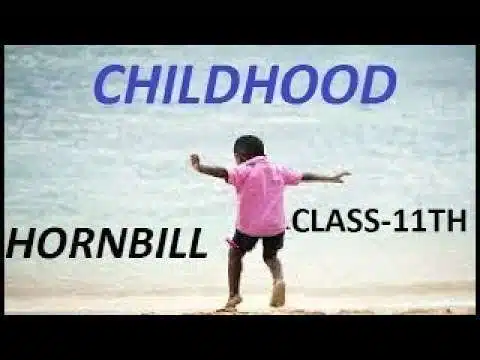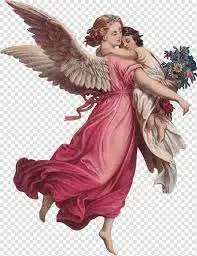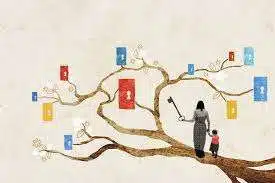
Extra Questions, Notes, Assignment and study material for Class 11th as Per CBSE Syllabus
Poem- 4 English Language and Literature
Childhood
By- Markus Naito
Introduction of the lesson- Childhood
Childhood is the golden period of life. A child is close to God or an angel. The reasons are obvious. He is simple and carefree. He has not been corrupted by the wicked ways of the world. He is innocent and lovable. It is a fashion to regret the loss of childhood.

In this very simple poem, the poet longs for the revival of childhood. He is fed up with the evil symptoms of growing up. As the child grows in years, in body and mind, he loses his simplicity. He starts questioning old ideas and old values. He refuses to be led by the nose, to accept the existence of hell and heaven. Grown-ups become more and more hypocritical. They talk about the virtues of love and brotherhood, but they don’t practise it. They think independently chiefly to disagree with others. The poet’s search for his childhood remains futile. It is the privilege of a small child only.
Short and Simple Summary of the lesson in English- Childhood/ Summary in simple Words/ Critical appreciation of the lesson – Childhood

The poem deals with the problems of growing up, from childhood to manhood. Only a child up to a certain age remains simple-hearted, believing and submissive. But with physical growth there comes a change in his thinking as well.
The poet wonders when he lost his childhood and became a teenager or grown-up. Perhaps the turning point was the age-factor. When he was past eleven, he refused to accept mutely what elders taught him. He started questioning the very existence of heaven and hell. He called them the creation of man’s imagination, with no geographical existence.
With growing up, he also discovered to his shock that grown-up people were blatant liars. Their actions did not match with their words. They preached love but practised hatred. They were selfish, greedy and untrustworthy.
The poet hits upon a new idea about when he ceased to be a child and became an adult. It was when he began to think freely and even differently from others. He began to judge people and their words critically. Such confidence gave him a sense of maturity.
But none of the alternatives satisfies the poet. He realises that it is impossible to become simple and trusting like a child. Childhood is a stage, a beginning. Once you have crossed the border-line, you become so-called worldly-wise and even wicked.
Summary in Hindi – Childhood
यह कविता बचपन से किशोरावस्था अथवा युवावस्था की ओर बढ़ने पर जो स्थिति बनती है उसकी जानकारी देती है I केवल बच्चा ही एक आयु सीमा तक सरल हृदय, विश्वास कर लेने वाला तथा दब्बू या विनम्र रहता है I आयु एवं शारीरिक विकास के साथ-साथ वैचारिक परिवर्तन भी आ जाते हैं I
कवि यह सोचकर हैरान है कि उसका बचपन किस दौरान पीछे छूट गया और वह किशोर बन गया I शायद उसके जीवन में यह मोड़ आयु के कारण आया जब वह 11 वर्ष पार कर गया, उसने मूक पर रहकर बड़े लोगों की बातों पर विश्वास करना छोड़ दिया I वह स्वर्ग और नर्क के अस्तित्व पर ही संदेह करने लगा I उसे लगा यह सब कल्पना की उपज है, क्योंकि इसका कोई भौगोलिक प्रमाण नहीं है I
ज्यों-ज्यों वह बड़ा हुआ उसे यह देखकर गहरा झटका लगा कि वयस्क लोग पक्के झूठे हैं I उनकी करनी और कथनी में कोई सामंजस्य नहीं होता I वे उपदेश तो प्रेम का देते हैं पर स्वयं घ्रणा से बाहर नहीं निकल पाते I वे स्वार्थी, लोभी तथा संदिग्ध रहते हैं I
एक और विचार कवि के मन में आता है जब वह बचपन से निकलकर वयस्क बन गया था I यह तब हुआ जब वह अन्य लोगों से भिन्न प्रकार का स्वतंत्र चिंतन करने लगा I वह लोगों तथा उनके कथन की आलोचना करने लगा I इस आत्मविश्वास ने उसे परिपक्वता का एहसास करा दिया I
पर इन विकल्पों में से कोई भी कभी को संतुष्ट नहीं कर पाता उसे लगता है कि बच्चे का भोलापन तथा सहज विश्वास कर लेने वाला गुण अब वह कभी नहीं हासिल कर पाएगा I बचपन तो एक श्रेणी है, एक आरम्भ होता है I एक बार उस सीमा रेखा को पार कर लेने के बाद आप दुनियादारी में निपुण तथा दुष्ट भी बन जाते हैंI
Childhood Extra Questions and Answers
Stanzas for Comprehension– Childhood
(1)
Read the stanza carefully and answer the questions that follow :
When did my childhood go?
Was it the day I ceased to be eleven,
Was it the time I realised that Hell and Heaven.
Could not be found in Geography.
And therefore could not be,
Was that the day!
Word-Notes
when did my childhood go–the poet wonders when he outgrew his childhood and became an adult. This change is as much a matter of physical growth as of mental growth. Childhood denotes innocence whereas an adult becomes worldly-wise and even wicked; ceased–stopped: realised–with age came wisdom and understanding. He was convinced that hell and heaven are just myths and unreal. They do not exist on earth; in Geography–on world map; could not be-hence they have no fixed location anywhere on the earth.
मेरा बचपन कब खत्म हो गय ा? क्या उस दिन मैं वयस्क हो गया जब मैंने 11 वर्ष पूरे कर लिए तथा मेरी सोचने, समझने तथा प्रश्न पूछने की बुद्धि विकसित हो गई I शायद उस समय मैं व्यस्त हो गया था जब मुझे पता चला कि स्वर्ग और नर्क का कोई भौगोलिक अस्तित्व नहीं है, और इसलिए वे काल्पनिक ही है I क्या उसी दिन मेरा बचपन पीछे छूट गया और मैं जवान हो गया ?
Questions
(i) Give the title of the poem and the name of the poet.
(ii) What according to the poem is involved in the process of growing up?
(iii) What is the poet’s feeling towards childhood?
Ans.
(i) The title of the poem is ‘Childhood’. The poet’s name is Markus Natten.
(ii) As the poet grew up, he began to think, question and challenge the things which had been taught to him by grown-ups. Now he has realised that heaven and hell do not exist in reality.
(iii) The poet is somewhat sad at the loss of his childhood innocence, simplicity and honesty.
(2)
When did my childhood go?
Was it the time I realised that adults were not
all they seemed to be,
They talked of love and preached of love,
But did not act so lovingly,
Was that the day!
Word-Notes
when did …? —at what point of time did I outgrow my childhood and become a grown-up person?, समय और आयु के किस मोड़ पर मेरा बचपन पीछे छूट गया मैं वयस्क हो गया ?; I realised … be—he became a grown-up person with an understanding to distinguish between right and wrong, between good and evil. He discovered that the grown-up people were not always truthful. They did not practise what they preached; preached—taught, वयस्क लोग मुखौटा लगाए रहते हैं वे प्यार का उपदेश तो देते हैं पर प्यार-भरा व्यवहार नहीं करते I
पता नहीं किस मोड़ पर या समय पर मेरा बचपन पीछे रह गया और मैं जवान हो गया I शायद उस समय यह परिवर्तन हुआ जब मैंने देखा कि वयस्क वैसे वास्तव में सीधे-सादे या सज्जन नहीं होते जैसे दिखते हैं I वे बातें तो प्यार की करते हैं, उपदेश भी यही देते हैं पर स्वयं नफरत में डूबे रहते हैं, प्यार भरा आचरण नहीं करते I शायद तभी मैं बुद्धि से वयस्क हो गया था I
Questions
(i) What is the poet’s first shocking observation about the grown-ups?
(ii) What does the poet put on the top of human virtues?
(iii) What does he regret?
Ans.
(i) The poet notes with regret that the grown-ups tend to become liars and hypocrites.
(ii) Love is the noblest human virtue.
(iii) He deplores that grown-ups do not practise what they preach.
(3)
When did my childhood go?
Was it when I found my mind was really mine,
To use whichever way I choose,
producing thoughts that were not those of other people
But my own, and mine alone
Was that the day!
Word-Notes
go–was left behind, got lost,खो गय ा; my mind was really mine—when I began to think independently and clearly; producing … people—when the poet refused to accept and repeat blindly what others told him when he began to apply his own mind and created original ideas; was that the day!—the poet is unsure about the time of his transition from childhood to adulthood.
किस मोड़ या समय पर मेरा बचपन पीछे छूट गया और मैं दुनियादारी सीखकर बड़ा हो गया I क्या वह उस समय हुआ जब मैंने महसूस किया कि मेरे पास अपना एक मस्तिष्क है जिसका उपयोग मैं अपनी इच्छानुसार कर सकता था मैं अन्य लोगों की बातों पर विश्वास न करते हुए स्वयं मौलिक एवं स्वतंत्र चिंतन करने लगा I शायद वही दिन मेरे जीवन में परिवर्तन ले आया I
Questions
(i) Does the poet really miss his childhood or welcome his teenage?
(ii) What did the poet discover with his growing-up?
(iii) Why do you consider free thinking as most valuable?
Ans.
(i) The poet takes the middle path in this stanza. Childhood stands for purity and innocence. But its loss is compensated by the gain of understanding in adulthood. He can now think freely and originally.
(ii) The poet discovered his faculty to think, rationalise and distinguish between right and wrong.
(iii) Free thinking means to be able to think on your own. Only a brainless person would accept blindly whatever he is told or taught.
(4)
Where did my childhood go?
It went to some forgotten place,
That’s hidden in an infant’s face,
That’s all I know.
Word-Notes
where … go?–In the first three stanzas, the poet shows his curiosity to know when he joined the class of the grown-up people. Now he wonders where his childhood could be discovered; forgotten–unknown, which he doesn’t remember; hidden–reflected, can be seen; infant–baby, one remains innocent and even ignorant in early age. A baby alone is angelic, pure in thought and action. The innocent expression on a child’s face gives him a clue where his childhood is still hiding and alive.
मेरा बचपन कब मुझसे बिछुड़ गया, यह तो मैं निश्चित रूप से नहीं बता सकता I पर वह अब कहाँ पर छुपा बैठा है, कहाँ पर मैं उसकी झलक पा सकता हूँ, यह मैंने सोच लिया है I वह तो ऐसे स्थान पर चला गया है जिसकी याद भी मुझे अब नहीं है I वह तो बच्चे के चेहरे में छिपा हुआ है, बच्चे के चेहरे में ही मेरे अपनी बचपन का प्रतिबिंब दिखता है, मैं तो बस इतना ही जानता हूँ I
Questions
(i) What painful discoveries does the poet make as he grows in years?
(ii) Why does he hold childhood so dear?
(iii) Where can one see childhood in pure form? Ans.
Ans.
(i) The poem deals with the problems of growing up. As the poet grows up, he realises that heaven and hell do not exist and that grown-ups do not practise what they preach.
(ii) Childhood is dear to the poet because up to a certain age, the child is free from so many vices and hypocrisy. As the child grows up, he loses his innocence.
(iii) Now that the poet has outgrown his childhood, he can never regain it. He can at best get a glimpse of his childhood innocence in the face of an infant.
Short Answer Type Questions of the Lesson – Childhood
1. Give the theme and central idea of the poem Childhood.
Ans. The theme of the poem is the process of growing up, from childhood to adulthood. The childhood, the heavenly period of innocence, lasts until one becomes a teenager. This transition brings about a radical change in one’s physique and understanding.
2. What loss does the poet Markus Natten regret? What does he speculate?
Ans. Natten regrets the loss of his childhood, his childlike purity and innocence. He wonders where he lost it, perhaps when he crossed eleven and developed a questioning attitude. Now he realised that heaven and hell were imaginary things. He also noticed that grown-ups were blatant liars. They talked of love but practised hatred. Finally, he started thinking freely and differently from others.
3. What faults does the poet find in grown-ups?
Ans. The poet notes with sorrow that grown-ups are hypocrites. They do not practise what they preach.
4. What are the three hallmarks of growing up, according to Natten?
Ans. (i) The ability to see the difference between facts and fiction, between right and wrong.
(ii) Hypocrisy. Grown-ups become hypocrites. They talk about the brotherhood of mankind but they do not act on that principle.
(iii) The ability to use one’s mind independently.
5. What are the poet’s search and questioning? Does he get a satisfying answer?
Ans. The poet has lost his childlike innocence. He wonders when he outgrew his childhood and where he left it behind. After some analysis and guesses, he gets the only answer to his question. Only a child has the privilege to remain simple, honest and clean. As one grows up in years one becomes dishonest. Childhood lies hidden in the face of an infant.
Important Long/ Detailed Answer Type Questions- to be answered in about 100 -150 words for each value-based questions of the Lesson – Childhood
1. The poem ‘Childhood’ exposes man and presents him in his true colours. All adjectives displaying negative qualities are not enough for such a man. This poem very innocently goads him to his real self. Explain.
Ans. Childhood symbolises innocence, purity, softness and love. As a child grows, these qualities start receding. Man becomes impure, cunning, shrewd, and a hypocrite. Grown-ups become blatant liars. They talk of love but practise hatred. They preach brotherhood and mankind but perpetuate hatred and killing. Simplicity and honesty evaporate into thin air the moment man crosses the threshold of innocent childhood.
Every effort should be made to revive that innocence of childhood. Every step should be taken to fill the vacuum created by the greed and selfishness of man with the warmth of the innocence and laughter of a child. There would be less hatred and more peace everywhere if a man starts practising what he preaches. It can happen if a man brings forth his true noble qualities to the fore. Layers of hatred have covered the purity and innocence of man. If a man removes this facade, the world would become a better place to live in.